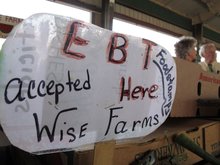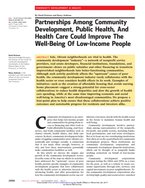Found 15 resources.
0
0
0
Moving Health Care Upstream (MHCU) is based on the belief that health systems can address persistent and costly health inequities by moving “upstream”—beyond the walls of hospitals and clinics and into the communities, collaborating with community-based organizations to address the root causes of disease. The various areas of work within MHCU share a common focus-supporting hospitals and community stakeholders in testing and spreading strategies to move upstream, and sharing “what works” to inform the field and accelerate the upstream movement in the field as a whole. Policy Learning Labs are...
Topics: Child welfare, Early childhood, Food insecurity, Green, Health, Housing, Legislation & Policy, Nutrition, Partnerships, Youth
 Shared by Housing Is
on May 1, 2019
Shared by Housing Is
on May 1, 2019 0
0
0
The Addressing Healthcare’s Blindside in Albuquerque’s South Side (AHBASS) collaborative participated in the BUILD Health Challenge’s first cohort with the intention of “making the healthy choice, the easy choice” for community members. Now you can learn about their strategies, approaches, application of the BUILD principles, and outcomes in this new case study documenting their work. Follow along in this case study and see how this Albuquerque, NM, based team addressed chronic disease and self-management in their community. Together, they established a multi-sector collaboration that...
Topics: Data sharing, Food insecurity, Health, Low-income, Nutrition, Partnerships
0
0
0

Square, the financial technology company known best for its slick iPad transactions, said Thursday it provided the funds to Austin’s Novo Dia Group to ensure that recipients of the Supplemental Nutrition Assistance Program (SNAP) can use their benefits at farmers markets without interruption. The investment also gives Square a window into the lucrative market for SNAP benefits, worth $63 billion annually.
Topics: Food insecurity, Low-income, Nutrition, Partnerships
0
0
0
As summer approaches, the West Virginia Department of Education is looking to partner with organizations in an effort to provide meals and activities for children while schools are out of session.
Topics: Education, Food insecurity, Low-income, Nutrition, Partnerships, Youth
 Shared by Housing Is
on Feb 11, 2019
Shared by Housing Is
on Feb 11, 2019 0
0
0
The firearm, obesity, and opioid epidemics are among the most important public health crises of our time. Each epidemic has a complex etiology that challenges efforts at mitigation. From this, a central question arises for researchers, clinicians, and policymakers: How can we identify what matters most within a broad range of causal factors in these epidemics, and can we draw cross-epidemic inferences that will help inform our thinking?
Topics: Food insecurity, Health, Low-income, Nutrition, Obesity, Partnerships, Safety, Substance abuse
0
0
0
“Families are borrowing from already-limited food budgets to keep a roof over their heads”
Topics: Food insecurity, Housing, Nutrition, Partnerships, Research
0
0
0
Massachusetts Attorney General Maura Healey on Tuesday announced $3 million in grants to 13 community organizations that address things like housing, hunger and other societal factors that affect someone’s health.
Topics: East Coast, Food insecurity, Health, Housing, Low-income, Nutrition, Partnerships, Preventative care
 Shared by Housing Is
on Jan 16, 2019
Shared by Housing Is
on Jan 16, 2019 0
0
0

As state and federal officials increasingly search for ways to curb rising health care costs, a decades-old idea is gaining traction: helping people with challenges that have nothing to do with medical care but everything to do with their health.
Topics: Cost effectiveness, Food insecurity, Health, Homelessness, Housing, Low-income, Medicaid / Medicare, Nutrition, Partnerships, Preventative care, Stability, Transportation
0
0
0

Sweet Water Foundation transformed four blocks in Englewood to cultivate community and help build skills, resources, and opportunities for residents.
Topics: Community development, Family engagement, Food insecurity, Green, Health, Low-income, Midwest, Nutrition, Partnerships, Place-based, Sustainability, Youth
0
0
0
The Vita Health & Wellness District is a one-mile corridor in Stamford, Connecticut, that has positioned itself as a “health-themed neighborhood,” offering mixed-income housing, health care services, community farming, early childhood education programming, and supportive services to residents. Led by the city’s public housing authority Charter Oak Communities and Stamford Hospital, this collaboration of city agencies and community-based organizations has focused on building physical and social capacity in a distressed neighborhood, with an emphasis on leveraging collective investments to...
Topics: Community development, Education, Food insecurity, Funding, Health, Housing, Nutrition, Partnerships
 Shared by Housing Is
on Aug 9, 2018
Shared by Housing Is
on Aug 9, 2018 0
0
0
Homelessness among children is correlated with developmental delays, fair or poor health, and high healthcare utilization. Associations of homelessness specifically among infants younger than 12 months, however, are unknown. This study evaluates homelessness during infancy as a risk for adverse infant and maternal health and hardship.
Topics: Child welfare, Depression, Disabilities, Dual-generation, Early childhood, Education, Family engagement, Food insecurity, Grade-level proficiency, Health, Homelessness, Housing, Low-income, Metrics, Partnerships, Pre-natal, Research, School-readiness, Youth
 Shared by Housing Is
on Aug 1, 2018
Shared by Housing Is
on Aug 1, 2018 0
0
0
The community development “industry”—a network of nonprofit service providers, real estate developers, financial institutions, foundations, and government—draws on public subsidies and other financing to transform impoverished neighborhoods into better-functioning communities. Although such activity positively affects the “upstream” causes of poor health, the community development industry rarely collaborates with the health sector or even considers health effects in its work. We propose a four-point plan to help ensure that existing and future collaborations achieve positive outcomes and...
Topics: Community development, Food insecurity, Funding, Health, Low-income, Partnerships, Supportive housing, Transportation
 Shared by Housing Is
on Jul 24, 2018
Shared by Housing Is
on Jul 24, 2018 0
0
0
The Conway Center is a project of a nonprofit housing and services organization, So Others Might Eat, and a federally qualified health center, Unity Health Care, in Washington, DC. This $90 million community development initiative will colocate employment training, health care services, and affordable housing under one roof in Ward 7, an area of DC experiencing high poverty and unemployment, and poor health outcomes. The partnership aims to improve access to affordable rental housing, increase livable-wage job attainment, and connect residents to high-quality health care services. Although...
Topics: Community development, Cost effectiveness, Food insecurity, Health, Housing, Low-income, Medicaid / Medicare, Partnerships, Place-based, Stability
 Shared by Housing Is
on Jul 13, 2018
Shared by Housing Is
on Jul 13, 2018 0
0
0
This brief aims to bring attention to non-Medicaid funding sources that states could potentially blend or braid to address social determinants of health and other needs that are not typically covered by Medicaid. It is intended to familiarize state Medicaid, public health, and other state policymakers with the funding streams of other agencies, and sketch out a continuum of options to help states coordinate funding to better serve the needs of low-income populations. Because this brief focuses on services for adult Medicaid beneficiaries, it does not address many of the funding sources...
Topics: Cost effectiveness, Data sharing, Dual-eligibles, Food insecurity, Funding, Health, Homelessness, Housing, Legislation & Policy, Low-income, Medicaid / Medicare, Mental health, Partnerships, Research, Substance abuse
 Shared by Housing Is
on Jul 12, 2018
Shared by Housing Is
on Jul 12, 2018 0
0
0
Boulder County, Colo., pioneered the movement. What can others learn from their experience?
Topics: Cost effectiveness, Data sharing, Dual-eligibles, Food insecurity, Health, Homelessness, Housing, Legislation & Policy, Low-income, Medicaid / Medicare, Partnerships, Place-based, Supportive housing, West Coast
 Shared by Housing Is
on Jul 5, 2018
Shared by Housing Is
on Jul 5, 2018 




